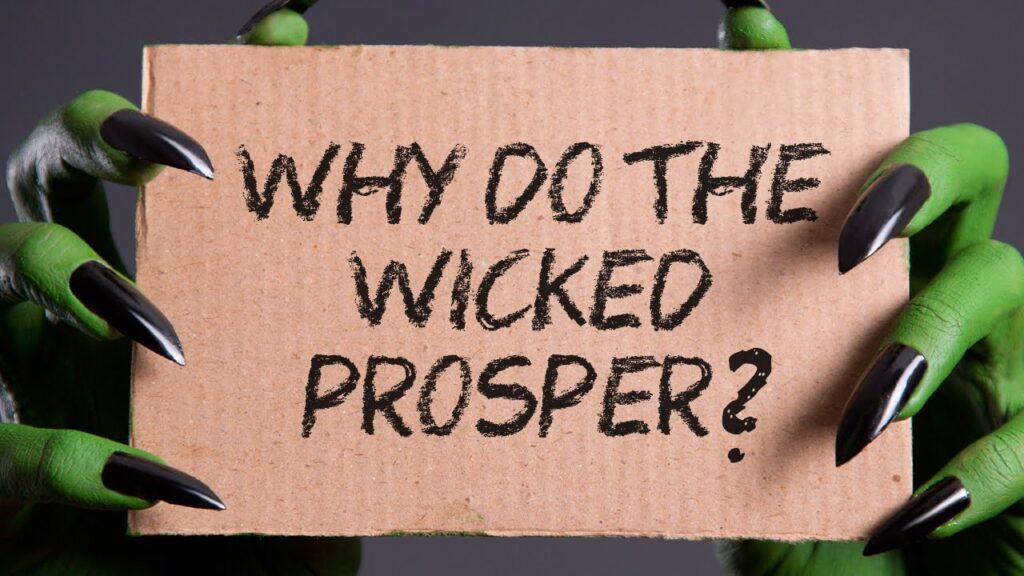Why do the wicked prosper? The lectionary readings for tomorrow (Sunday 20 February, Seventh Sunday after the Epiphany) are Genesis 45:3-11, 15; Psalm 37; 1 Corinthians 15:35-38; 42-50 and Luke 6:27-38. They give us a hint as to the answer.
The Genesis passage is about Joseph in Egypt, revealing himself to his brothers who had wickedly sold him into slavery decades earlier, so that they might prosper. They become very anxious when they realize the “lord of all Egypt” (verse 9) has power to punish them for what they did to him. Joseph puts them at ease.
He has spent years pondering his situation. He has arrived at a conclusion. He does not focus on the wrong they did to him. Rather, he sees it as the God-ordained first step on his road to acquire power which he would later exert to save his ethnic group from starvation and death. He says, “God sent me before you to preserve life.” (verse 5)
The Corinthians passage has Paul using the word “fool” to describe some of his Corinthian listeners. He used that four-letter word on them because they asked what kind of body those raised from the dead will have. He told them not to ask silly questions. He said they should be satisfied with the answer that the raised will have “heavenly bodies.”
The gospel passage tells us to love our (prosperous) enemies. It tells us we must be people who do good always, and never return harm for harm. But there is a sting in the tail. We should expect our responses to so embarrass our opponents that they will change their behaviour towards us – if only to avoid being mocked by others.
There something troubling in the passage. It suggests that those who give much will receive much. This is one of the reasons why many people give generously to churches, mosques, temples. They give thinking “God is no man’s debtor,” so they will receive much in return. I do not have space to discuss that. I leave it to you to ponder and discuss.
I want to focus on Psalm 37, which some authors classify as a “wisdom psalm.” They think each verse should be viewed as a proverb to be pondered. Others don’t think this is a good way to read the psalm. They think it should be read as a meditation on the mystery of life.
I pasted the text of the psalm into a word document and highlighted the word “wicked” and its cousins such as “evildoers,” “transgressors,” “wrongdoers” and “those who carry out evil devices.” By my count, such words and expressions occur 19 times in the 40 verses.
The central concern of the author is expressed in “Fret not yourself because of evildoers, be not envious of wrongdoers” (verse 1), “fret not yourself over the one who prospers in his way, over the man who carries out evil devices!” (verses 7b) and “Better is the little that the righteous has than the abundance of many wicked” (verse 16).
The author’s implicit question is “Why do the wicked prosper?”
What are we to make of the prosperity of the corrupt, of those who “draw the sword and bend their bows to bring down the poor and needy, to slay those whose way is upright” (verse 14), the ones “who borrow and do not pay back” (verse 21)?
What are we to make of the fact that we know many examples which prove this claim false: “I have not seen the righteous forsaken or his children begging for bread” (verse 25)? There are so many examples of godly Bible translators, missionaries, pastors, who have suffered so much!
The psalmist doesn’t answer his question. Instead, he urges us to focus on what we know pleases God, what He has revealed to us in His law, principally in the Ten Commandments and the Sermon on the Mount, and in our consciences.
We are to “do good; dwell in the land and befriend faithfulness” (verse 3). We are to believe “He will bring forth [our] righteousness as the light, and [our] justice as the noonday” (verse 6).
Why do the wicked prosper? We don’t know for sure, just like we don’t know what our heavenly bodies will be like when we are raised from the dead. We believe it’s to do with God having chosen to let us make our own decisions (exercise free will) and having chosen to defer judgment.
Is Psalm 37 daft? No, because despite what we know of the great worldly comfort and wealth of the corrupt, we know we sleep better when we obey the injunction of our Lord in Luke 6:31 “as you wish that others would do to you, do so to them.” Also, not all the corrupt thrive; they too face pain, suffering and failure.
Why do the wicked prosper?
To learn more about Rama, click here.


